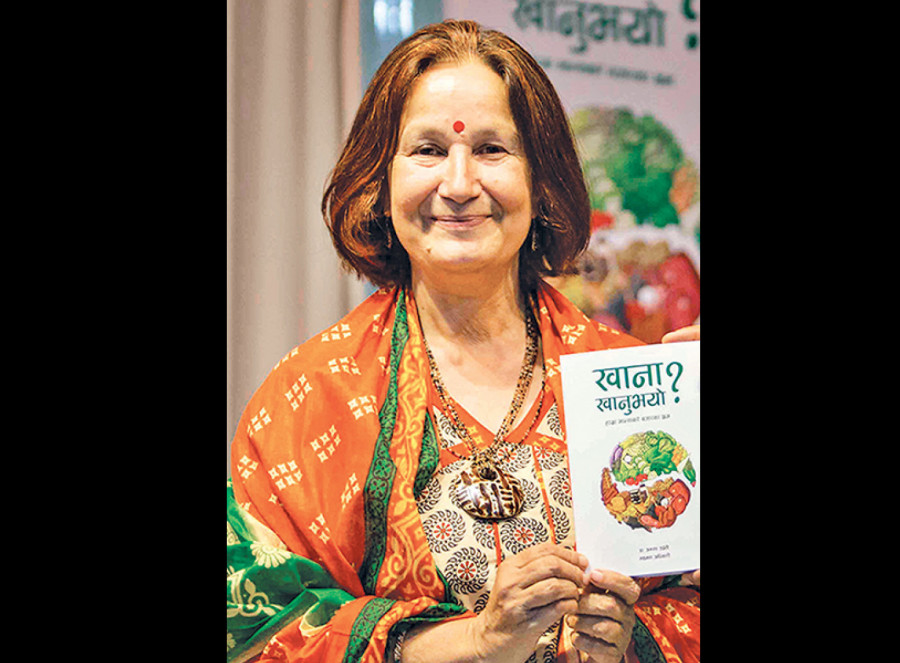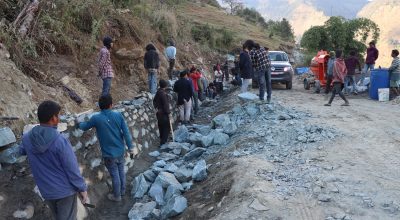
Kathmandu: A prominent advisor to the Baliyo Nepal project, a national campaign inaugurated by President Bidya Devi Bhandari and supported by the Chaudhary Foundation in association with the Gates Foundation, has resigned on grounds that the campaign promotes junk food.
Dr Aruna Uprety, one of Nepal’s foremost nutritionists, resigned from Baliyo Nepal, saying that she had made a mistake in becoming part of the project without understanding its intentions.
“I am ashamed to have been part of the vested interest of a company that promotes junk food,” Uprety told the Post over the phone from Makwanpur. “This has seriously harmed my years-long initiatives against the promotion of junk food and raises questions about my credibility.”
Uprety has long championed the intake of indigenous crops like buckwheat, millet and barley, and locally available organic leafy vegetables, fruits and dairy products to combat malnutrition.
Uprety, who recently took part in the project’s programme in Butwal, said that she was overwhelmed by the involvement of the Bill and Melinda Gates Foundation, which provided financial support to the Chaudhary Foundation’s Baliyo Nepal project. Chaudhary Foundation is the philanthropic arm of Chaudhary Group, a company that is primarily known for its Wai-Wai instant noodles. The Foundation had secured a grant of $788,192 million last year from the Gates Foundation to launch, develop and scale-up Baliyo Nepal, “a movement to mobilise the private sector and civil society to support Nepal’s efforts in the reduction of chronic malnutrition in the country”, according to the Gates Foundation.
Although Nirvana Chaudhary, managing director of Chaudhary Group, said on social media that “CG has refrained and does not have and does not need noodle to be part of this movement”, in an interview with the Post in August, Chaudhary had specifically said that “We will definitely start with noodles, and then move to juice in the later stages.”
Uprety said she has formally resigned as an advisor to the project and will also be writing an email to the Gates Foundation about the negative impacts of promoting fortified junk food in Nepal. Along with Uprety as the advisor, the five-member board of Baliyo Nepal includes Chaudhary, former vice-chair of the National Planning Commission Swarnim Wagle, Nabil Bank CEO Anil Shah, former national cricket team captain Paras Khadka and singer Ani Choying Drolma.
While Wagle has said that the programme will not include any “noodles or junk food”, Baliyo Nepal’s website states, “If we improve the overall nutritional quality of products that are heavily consumed by lower-income families, including packaged foods, we can have a significant impact on preventing and reducing malnutrition in Nepal.” Over four million packets of instant noodles are consumed every day in Nepal, according to the World Instant Noodle Association.
The campaign was inaugurated last Friday by President Bhandari as part of a nation-wide effort to improve nutrition among children. Since then, the project has garnered much criticism, with many questioning “if the Baliyo Nepal project was created for the fortification of junk food by Nepal’s largest junk food producer.”
Malnutrition has been dubbed Nepal’s “silent crisis”. According to the 2016 Nepal Demographic Health Survey, 36 percent of children under five years of age suffer from chronic malnutrition (stunting or low height-for-weight) and 10 percent suffer from acute malnutrition (wasting or low weight-for-height). Another 27 percent of children are underweight and one percent is overweight, according to the survey. The government aims to reduce the stunting rate from the existing 36 percent to 24 percent by 2025, and to 14 percent by 2030, in order to meet Sustainable Development Goals.
Doctors say that nutrition deficiencies in mothers during pregnancy increases the risk of complications during childbirth, the likelihood of maternal and neonatal deaths as well as low birth weight.
Several studies have shown that junk food is one of the major causes behind malnutrition and undernutrition in the country. Children under the age of two in Nepal are getting a quarter of their calories from junk food, according to a recent study published in the Journal of Nutrition.
The study, carried out in the Kathmandu Valley by researchers working for Helen Keller International, a global health organisation, stated that biscuits, crisps, instant noodles and sugary drinks were displacing foods with vitamins, minerals and other vital nutrients that infants and children require to grow well.
According to Kiran Rupakheti, joint-secretary at the National Planning Commission, the promotion of processed foods like instant noodles would contradict Nepal’s commitment to promoting fresh and locally produced food products.
“Promoting processed foods and fortifying noodles will not help mitigate the malnutrition that exists in the country,” said Rupakheti. “Processed foods contain an excessive amount of salt, sugar and fat, which are not good for health.”
Uma Koirala, an executive board member of Baliyo Nepal, however, said that the programme only promotes the consumption of eggs and flour porridge, not instant noodles. The project will not offer free eggs or porridge flour but will ask people to purchase them from the market, she clarified.
“We will launch an awareness campaign about the importance of nutrition intake,” said Koirala. “We will not advocate for nutrition fortification in noodles.”
According to Koirala, the project will also advocate for the production of quality food products at affordable prices.
“We will ask producers to produce porridge flour in smaller pouches to ease access among people,” she said.
But this is easier said than done, said Dr Shyam Raj Upreti, former director of the Child Health Division at the Department of Health Services.
“Even the federal state and the provinces have failed to deliver fortified flour to children, pregnant women and new mothers in districts of Karnali province and in Solukhumbu district, despite the allocation of very large budgets,” said Upreti.
If Baliyo Nepal promotes processed food, regardless of whether that includes instant noodles, it will ultimately serve the interests of the company that produces such food, he said. (Source: The Kathmandu Post, Arjun Poudel)












